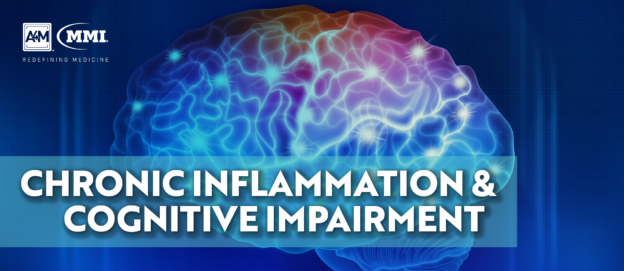Chronic inflammatory diseases are the most significant cause of death across the globe and their prevalence is projected to rise persistently over the next few decades in the United States. Although inflammation occurs naturally in the body and the majority of the population will experience acute inflammation at some point in their lifetime, it may trigger the beginning of a disease process if left untreated. Tissue death and the thickening or scarring of connective tissue are just some of the detrimental outcomes related to ongoing inflammation. Prolonged or chronic inflammation can lead to long-lasting damage of the heart, brain, and other organs, increasing the risk of cardiovascular events and mortality rates.
However, the long-term effects of chronic inflammation have not yet been fully discovered, leaving room for much-needed research on its potential role in a variety of health conditions. Currently, there is a growing body of evidence suggestive of its neurodegenerative potential. Inflammation in the brain has long been associated with Alzheimer’s disease while researchers continue to investigate the relationship between the immune response and brain function.
Inflammation and Cognitive Function
Recent studies implicate a potential correlation between systemic inflammation during midlife and cognitive decline later in age. A new study published in the February issue of Neurology aimed to better understand this link and its potential long-term effects on brain function.
Researchers evaluated inflammation markers and cognitive function in over 12,000 middle-aged adults with an average age of 57 over a 20-year period. An inflammation composite score was created using 4 blood biomarkers measured at the first and last visit: fibrinogen, white blood cell count, von Willebrand factor, and factor VIII. Levels of C-reactive protein (CRP) were tested during the second visit, while cognition was assessed over 3 visits during the 20-year period utilizing measures of language, executive function, and memory.
Neurodegenerative Effects of Inflammation
Upon conclusion of the study, researchers found that inflammation appeared to be associated with increased cognitive decline in middle-aged patients – even after adjusting for demographic and other variables. Study participants who had higher inflammatory biomarker scores at visit 1 experienced 7.8% greater cognitive decline than participants with lower scores.
One particular biomarker seemed to have a significant effect on cognitive function. Participants with high levels of C-reactive protein demonstrated cognitive decline to an even higher degree. Those displaying the highest levels of the CRP marker at the beginning of the study showed a 12% decline in cognitive function.
The study’s results suggest chronic inflammation may be an important target for intervention in order to prevent cognitive impairment in the aging population. However, researchers note that it is possible that chronic inflammation is not the cause and functions merely as a marker or response to neurodegenerative brain diseases that cause cognitive decline. However, the findings do highlight the potential early pathogenic role of systemic inflammation in driving cognitive decline, especially in older adulthood.
Further research is necessary to accurately determine the relationship between chronic inflammatory conditions and brain function, taking into account specific inflammatory markers and their role in cognitive impairment.

